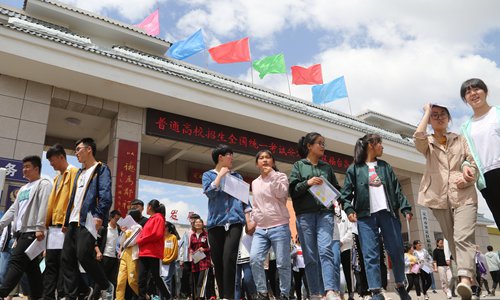China revises policy on curbing ‘gaokao migration’ to make higher education fairer
By Wang Qi Source:Global Times Published: 2020/6/10 16:05:29
China revises policy on curbing 'gaokao migration' to make higher education fairer

Students walk out of a school where they had sat a 2019 Gaokao exam. Photo: IC
China's Ministry of Education (MOE) announced on Wednesday that from 2021, international students who intend to study at a Chinese university have to hold a valid overseas passport for four years or longer, and also have a record of living overseas for at least two years if at least one of their parents is Chinese citizen and they were born overseas.
The ministry made the revision recently based on the 2009 version of the regulation, saying the move will not only improve the institutional framework but also make higher education fairer in China.
Xiong Bingqi, a deputy director of the Shanghai-based 21st Century Education Research Institute, told the Global Times on Wednesday that instead of a restriction on all international students, the revised regulation is crucial in curbing so-called "gaokao migration," a term that refers to Chinese families who change their children's nationality in order to enjoy preferential policies as overseas students when applying for China's top universities.
Universities and colleges must closely examine the nationality status and registration qualifications of international students who apply for admission in accordance with the law. If the nationality status is in doubt, universities must consult with the exit and entry administration department under the public security authorities, according to the new regulation.
For international students studying in Chinese high schools and whose parents are Chinese, if they fail to meet the above requirement but hold a "permanent resident identity card for foreigners," they can apply for China's college entrance examination, or gaokao.
In addition to the mainland, the MOE said the regulation will also take effect for residents of the Hong Kong, Macao and the island of Taiwan who hold a foreign passport.
The issue quickly became a hot topic on Sina Weibo, receiving more than 25 million views within two hours. Some believe that it is necessary to plug this loophole and refine the policy, while others pointed out that the regulation is not a fundamental solution to the preferential treatment that international students enjoy.
"The two years (of living abroad) is far from enough. It makes more sense if those students who hold foreign passports have the majority of their education overseas," said an internet user on Weibo.
"I hope the MOE can eliminate the preferential treatment for international students and strictly examine their qualifications," said another, noting the preferential treatment has been used by some wealthy and powerful people as a way to get their children into China's top-tier universities.
However, some analysts believe that completely stopping "gaokao migration" is almost impossible, as a well-developed industrial chain has already been formed. On the other hand, some universities place great value on the quantity of international students in order to improve their influence and ranking.
The fundamental approach is to raise recruitment standards for international students, attach importance to their overall quality, and ensure strict academic training before graduation, said Xiong.
Yu Minhong, CEO of New Oriental Education and Technology and also member of the National Committee of the Chinese People's Political Consultative Conference CPPCC, proposed during the Two Sessions that the phenomenon of gaokao migration be curbed.
He called for existing requirements on time periods such as holding a foreign passport for four years and living overseas for two years to be raised, requirements for overseas student numbers in universities to be reduced, and to ensure that college enrolment is more transparent and subject to public oversight.
According to Yu, in 2018, a total of 258,000 international students came to China's colleges and universities to receive an education, far exceeding the target of 150,000 set by the MOE in 2010.
There have been an increasing number of cases in which Chinese people have obtained foreign citizenship or permanent residence visas through various ways, then taking part in examinations for overseas Chinese in domestic universities as foreigners or overseas Chinese in order to avoid the highly competitive gaokao.
Some analysts warned that educational migration brings a high risk of cheating. Furthermore, not all ethnic Chinese who want to study in China are gaokao migrants who just want a graduation certificate, and supporting those who genuinely want to pursue higher education in China is also necessary.
Newspaper headline: China revises policy on curbing 'gaokao migration' to make higher education fairer
Posted in: SOCIETY